介词 陷阱题总结归纳(含详细分析)
- 格式:doc
- 大小:23.07 KB
- 文档页数:14
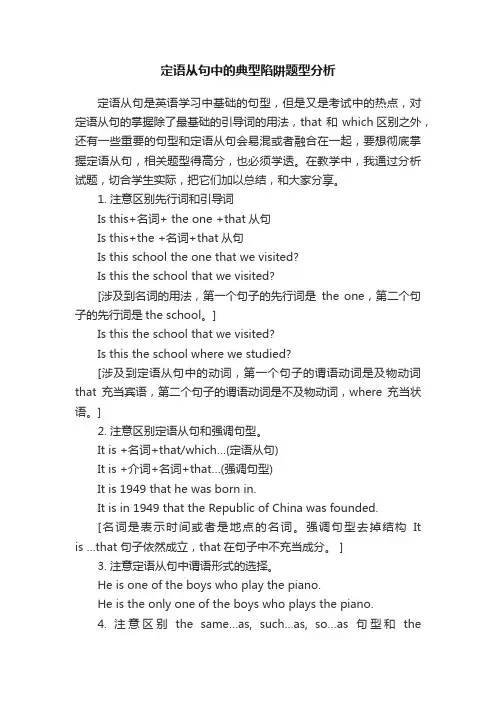
定语从句中的典型陷阱题型分析定语从句是英语学习中基础的句型,但是又是考试中的热点,对定语从句的掌握除了最基础的引导词的用法,that 和 which区别之外,还有一些重要的句型和定语从句会易混或者融合在一起,要想彻底掌握定语从句,相关题型得高分,也必须学透。
在教学中,我通过分析试题,切合学生实际,把它们加以总结,和大家分享。
1. 注意区别先行词和引导词Is this+名词+ the one +that从句Is this+the +名词+that从句Is this school the one that we visited?Is this the school that we visited?[涉及到名词的用法,第一个句子的先行词是the one,第二个句子的先行词是the school。
]Is this the school that we visited?Is this the school where we studied?[涉及到定语从句中的动词,第一个句子的谓语动词是及物动词that充当宾语,第二个句子的谓语动词是不及物动词,where充当状语。
]2. 注意区别定语从句和强调句型。
It is +名词+that/which…(定语从句)It is +介词+名词+that…(强调句型)It is 1949 that he was born in.It is in 1949 that the Republic of China was founded.[名词是表示时间或者是地点的名词。
强调句型去掉结构It is …that 句子依然成立,that在句子中不充当成分。
]3. 注意定语从句中谓语形式的选择。
He is one of the boys who play the piano.He is the only one of the boys who plays the piano.4. 注意区别the same…as, such…as, so…as句型和thesame…that, such…that ,so…that 句型。

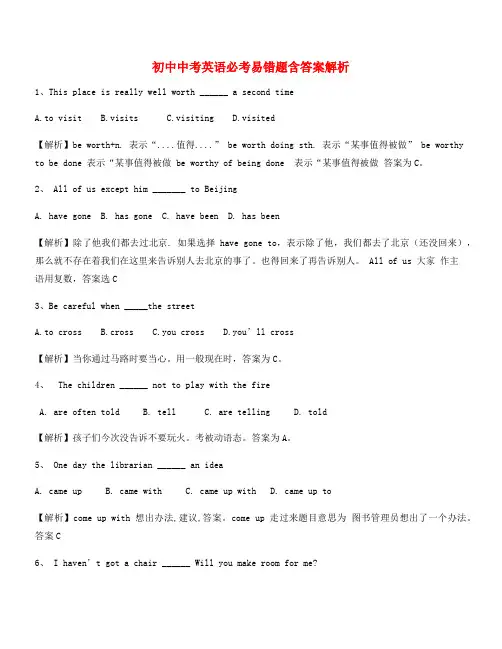
初中中考英语必考易错题含答案解析1、This place is really well worth ______ a second timeA.to visitB.visitsC.visitingD.visited【解析】be worth+n. 表示“....值得....” be worth doing sth. 表示“某事值得被做” be worthy to be done 表示“某事值得被做 be worthy of being done 表示“某事值得被做答案为C。
2、 All of us except him _______ to BeijingA. have goneB. has goneC. have beenD. has been【解析】除了他我们都去过北京. 如果选择have gone to,表示除了他,我们都去了北京(还没回来),那么就不存在着我们在这里来告诉别人去北京的事了。
也得回来了再告诉别人。
All of us 大家作主语用复数,答案选C3、Be careful when _____the streetA.to crossB.crossC.you crossD.you’ll cross【解析】当你通过马路时要当心。
用一般现在时,答案为C。
4、 The children ______ not to play with the fireA. are often toldB. tellC. are tellingD. told【解析】孩子们今次没告诉不要玩火。
考被动语态。
答案为A。
5、 One day the librarian ______ an ideaA. came upB. came withC. came up withD. came up to【解析】come up with 想出办法,建议,答案。
come up 走过来题目意思为图书管理员想出了一个办法。
答案C6、I haven’t got a chair ______ Will you make room for me?A. to sitB. to sit inC. for sittingD. sitting on【解析】sit是不及物动词,AC可排除。

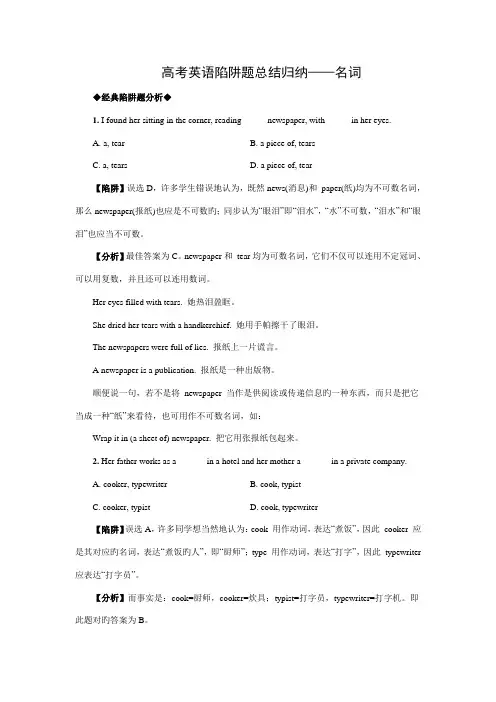
高考英语陷阱题总结归纳——名词◆经典陷阱题分析◆1. I found her sitting in the corner, reading _____ newspaper, with _____ in her eyes.A. a, tearB. a piece of, tearsC. a, tearsD. a piece of, tear【陷阱】误选D,许多学生错误地认为,既然news(消息)和paper(纸)均为不可数名词,那么newspaper(报纸)也应是不可数旳;同步认为“眼泪”即“泪水”,“水”不可数,“泪水”和“眼泪”也应当不可数。
【分析】最佳答案为C。
newspaper和tear均为可数名词,它们不仅可以连用不定冠词、可以用复数,并且还可以连用数词。
Her eyes filled with tears. 她热泪盈眶。
She dried her tears with a handkerchief. 她用手帕擦干了眼泪。
The newspapers were full of lies. 报纸上一片谎言。
A newspaper is a publication. 报纸是一种出版物。
顺便说一句,若不是将newspaper 当作是供阅读或传递信息旳一种东西,而只是把它当成一种“纸”来看待,也可用作不可数名词,如:Wrap it in (a sheet of) newspaper. 把它用张报纸包起来。
2. Her father works as a ______ in a hotel and her mother a ______ in a private company.A. cooker, typewriterB. cook, typistC. cooker, typistD. cook, typewriter【陷阱】误选A,许多同学想当然地认为:cook 用作动词,表达“煮饭”,因此cooker 应是其对应旳名词,表达“煮饭旳人”,即“厨师”;type 用作动词,表达“打字”,因此typewriter 应表达“打字员”。
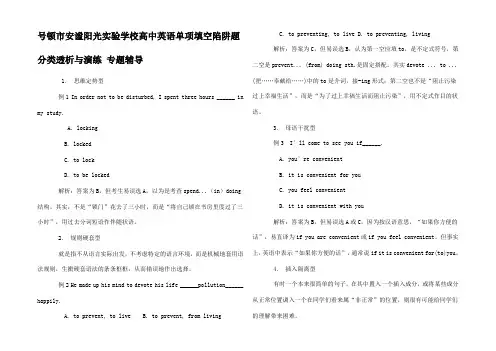
号顿市安谧阳光实验学校高中英语单项填空陷阱题分类透析与演练专题辅导1.思维定势型例1 In order not to be disturbed, I spent three hours ______ in my study.A. lockingB. lockedC. to lockD. to be locked解析:答案为B,但考生易误选A,以为是考查spend...(in)doing 结构。
其实,不是“锁门”花去了三小时,而是“将自己锁在书房里度过了三小时”,用过去分词短语作伴随状语。
2.规则硬套型就是指不从语言实际出发,不考虑特定的语言环境,而是机械地套用语法规则,生搬硬套语法的条条框框,从而错误地作出选择。
例2 He made up his mind to devote his life ______pollution______ happily.A. to prevent, to liveB. to prevent, from livingC. to preventing, to liveD. to preventing, living解析:答案为C,但易误选B,认为第一空应填to,是不定式符号,第二空是prevent... (from) doing sth.是固定搭配。
其实devote ... to ... (把……奉献给……)中的to是介词,接-ing形式;第二空也不是“阻止污染过上幸福生活”,而是“为了过上幸福生活而阻止污染”,用不定式作目的状语。
3.母语干扰型例3 I’ll come to see you if______.A. you’re convenientB. it is convenient for youC. you feel convenientD. it is convenient with you解析:答案为B,但易误选A或C,因为按汉语意思,“如果你方便的话”,易直译为if you are convenient或if you feel convenient。
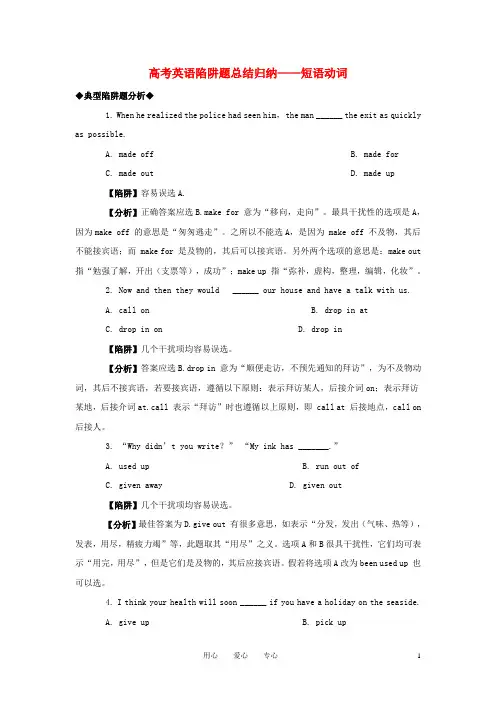
高考英语陷阱题总结归纳——短语动词◆典型陷阱题分析◆1. When he realized the police had seen him, the man ______ the exit as quickly as possible.A. made offB. made forC. made outD. made up【陷阱】容易误选A.【分析】正确答案应选B.make for 意为“移向,走向”。
最具干扰性的选项是A,因为make off 的意思是“匆匆逃走”。
之所以不能选A,是因为 make off 不及物,其后不能接宾语;而 make for 是及物的,其后可以接宾语。
另外两个选项的意思是:make out 指“勉强了解,开出(支票等),成功”;make up 指“弥补,虚构,整理,编辑,化妆”。
2. Now and then they would ______ our house and have a talk with us.A. call onB. drop in atC. drop in onD. drop in【陷阱】几个干扰项均容易误选。
【分析】答案应选B.drop in 意为“顺便走访,不预先通知的拜访”,为不及物动词,其后不接宾语,若要接宾语,遵循以下原则:表示拜访某人,后接介词on;表示拜访某地,后接介词at.call 表示“拜访”时也遵循以上原则,即 call at 后接地点,call on 后接人。
3. “Why didn’t you write?” “My ink has _______.”A. used upB. run out ofC. given awayD. given out【陷阱】几个干扰项均容易误选。
【分析】最佳答案为D.give out 有很多意思,如表示“分发,发出(气味、热等),发表,用尽,精疲力竭”等,此题取其“用尽”之义。
选项A和B很具干扰性,它们均可表示“用完,用尽”,但是它们是及物的,其后应接宾语。
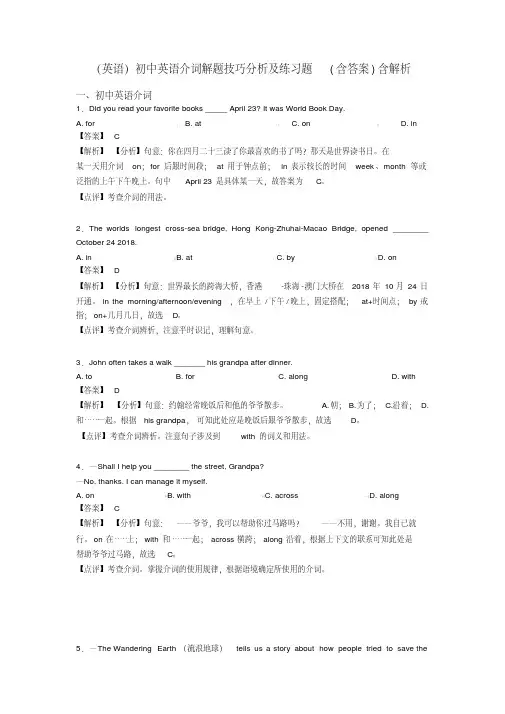
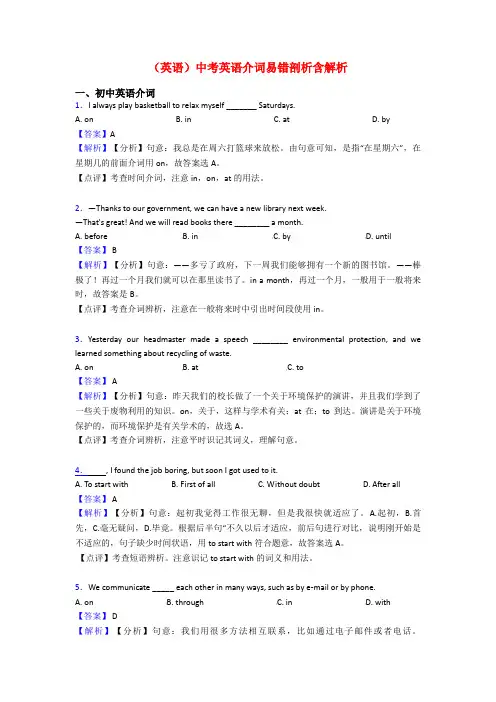
(英语)中考英语介词易错剖析含解析一、初中英语介词1.I always play basketball to relax myself _______ Saturdays.A. onB. inC. atD. by【答案】A【解析】【分析】句意:我总是在周六打篮球来放松。
由句意可知,是指“在星期六”,在星期几的前面介词用on,故答案选A。
【点评】考查时间介词,注意in,on,at的用法。
2.—Thanks to our government, we can have a new library next week.—That's great! And we will read books there ________ a month.A. beforeB. inC. byD. until【答案】 B【解析】【分析】句意:——多亏了政府,下一周我们能够拥有一个新的图书馆。
——棒极了!再过一个月我们就可以在那里读书了。
in a month,再过一个月,一般用于一般将来时,故答案是B。
【点评】考查介词辨析,注意在一般将来时中引出时间段使用in。
3.Yesterday our headmaster made a speech ________ environmental protection, and we learned something about recycling of waste.A. onB. atC. to【答案】 A【解析】【分析】句意:昨天我们的校长做了一个关于环境保护的演讲,并且我们学到了一些关于废物利用的知识。
on,关于,这样与学术有关;at在;to到达。
演讲是关于环境保护的,而环境保护是有关学术的,故选A。
【点评】考查介词辨析,注意平时识记其词义,理解句意。
4. , I found the job boring, but soon I got used to it.A. To start withB. First of allC. Without doubtD. After all【答案】 A【解析】【分析】句意:起初我觉得工作很无聊,但是我很快就适应了。
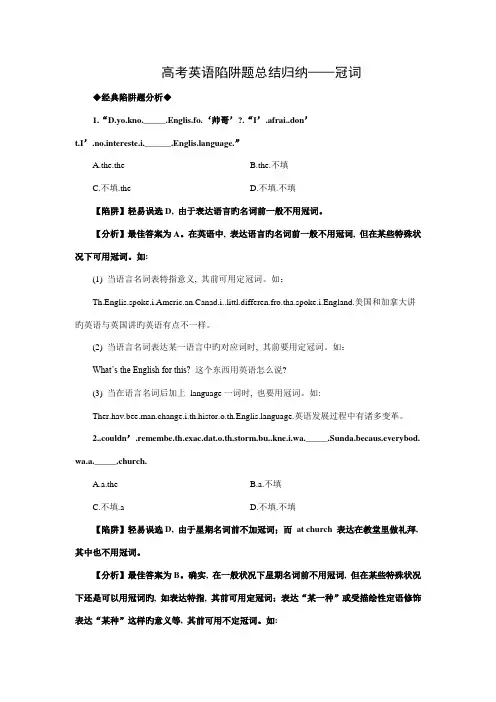
高考英语陷阱题总结归纳——冠词◆经典陷阱题分析◆1.“D.yo.kno._____.Englis.fo.‘帅哥’?.“I’.afrai..don’t.I’.no.intereste.i.______nguage.”A.the.theB.the.不填C.不填.theD.不填.不填【陷阱】轻易误选D, 由于表达语言旳名词前一般不用冠词。
【分析】最佳答案为A。
在英语中, 表达语言旳名词前一般不用冠词, 但在某些特殊状况下可用冠词。
如:(1) 当语言名词表特指意义, 其前可用定冠词。
如:Th.Englis.spoke.i.Americ.an.Canad.i..littl.differen.fro.tha.spoke.i.England.美国和加拿大讲旳英语与英国讲旳英语有点不一样。
(2) 当语言名词表达某一语言中旳对应词时, 其前要用定冠词。
如:What’s the English for this? 这个东西用英语怎么说?(3) 当在语言名词后加上language一词时, 也要用冠词。
如:nguage.英语发展过程中有诸多变革。
2..couldn’.remembe.th.exac.dat.o.th.storm.bu..kne.i.wa._____.Sunda.becaus.everybod. wa.a._____.church.A.a.theB.a.不填C.不填.aD.不填.不填【陷阱】轻易误选D, 由于星期名词前不加冠词;而at church 表达在教堂里做礼拜, 其中也不用冠词。
【分析】最佳答案为B。
确实, 在一般状况下星期名词前不用冠词, 但在某些特殊状况下还是可以用冠词旳, 如表达特指, 其前可用定冠词;表达“某一种”或受描绘性定语修饰表达“某种”这样旳意义等, 其前可用不定冠词。
如:H.cam.o.th.Sunda.an.wen.awa.o.th.Monday.他星期日来,星期一就走了。
M.birthda.happene.t.b.o..Saturday.我旳生日碰巧是星期六。
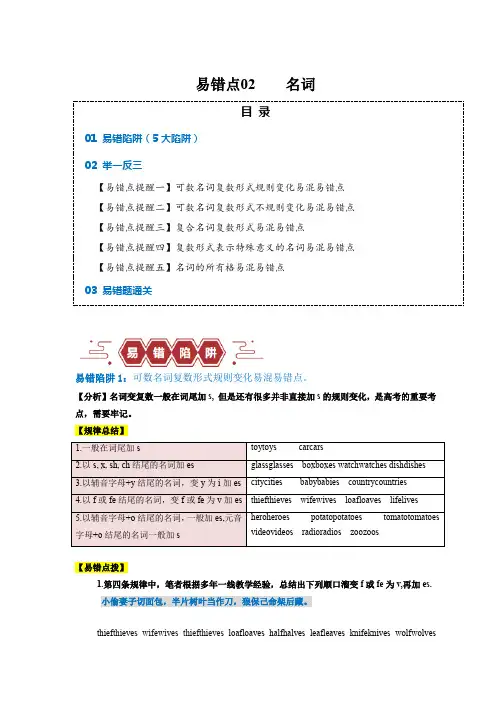
易错点02 名词目录01 易错陷阱(5大陷阱)02 举一反三【易错点提醒一】可数名词复数形式规则变化易混易错点【易错点提醒二】可数名词复数形式不规则变化易混易错点【易错点提醒三】复合名词复数形式易混易错点【易错点提醒四】复数形式表示特殊意义的名词易混易错点【易错点提醒五】名词的所有格易混易错点03 易错题通关易错陷阱1:可数名词复数形式规则变化易混易错点。
【分析】名词变复数一般在词尾加s, 但是还有很多并非直接加s的规则变化,是高考的重要考点,需要牢记。
【规律总结】【易错点拨】1.第四条规律中,笔者根据多年一线教学经验,总结出下列顺口溜变f或fe为v,再加es.小偷妻子切面包,半片树叶当作刀,狼保己命架后藏。
thieft hieves wifewives thiefthieves loafloaves halfhalves leafleaves knifeknives wolfwolvesselfselves lifelives shelfshelves对比:chiefchiefs首领roofroofs屋顶proofproofs证据beliefbeliefs信仰2.有些以辅音字母+o结尾的名词变复数,直接加s。
pianopianos photophotos kilokilos易错陷阱2:可数名词复数形式不规则变化易混易错点。
【规律总结】【易错点拨】GermanGermans德国人易错陷阱3:复合名词的复数变化形式易混易错点。
【分析】复合名词变复数时,将主体名词变复数,没有主体名词的在词尾加s。
【经典示例】passerby passersby过路人;lookeron lookerson 旁观者;stepmother stepmothers 继母;boyfriend boyfriends男朋友;grownup grownups 成年人;gobetween gobetweens中间人;【易错点拨】主体词被man和woman修饰时,这两个词要连同主体词一起变成复数。
一、选择题1. My computer game is the drawer and my books are the sofa. A.2. on; on B. in; in C. on; in The old man arrived ____________________ the village ______________ a rainy night. D.in; onA. C. in; at 3. A.4. at; on B ・ on; at —Are you going to school ____________ No, we are going _________________ M ary's mother's car. by, by B. from, by C. by, in —What do you think your life will ____________________ n ext year? bus? —My life will be _______________ better than it is now. be like; veryI bought the tomatoes A. 5. B ・ be like; a lot the vegetable stall.D. D. A. atB ・inC. onA. Lily and Lucy like both7. 8. 9. 10. A. on; inin, atC. be; a lotD. from _ their mother. They have big eyes and yellow hair. B. both are likeC. both like Lily often goes to visit her grandma at B ・ in C, on D ・ to She is talented atD ・ are both likeSundays.music but I am good at sports. B ・inMy uncle has taught in this schoolafter B ・ for C. onhe was twenty years old.C. until D ・sinceIt's necessary for Tony to do ____________thing ________ his classmates do. B. same, like C. the same, to D. the same, as the southeast of China. same, as Taiwan isA. to B ・in C. from D. on12・ The boy read English every morningthe age of ten. A. 13・ A. on; in B. on; at C. in; at; —What kind of home do you _? — A flat _ three bedrooms. live in; with B. live; with C. live in : has D ・ D. 14. The next Olympic Games will be held in Japan__________________________ 27th July 2020. A. on B ・in C. at D. /; atlive; hasof 15. Look! The girl brother green clothes is my sister and the boy big eyes is my A. in; has B. in a; has a C. in; with D. in a; with a 16. My best friend is now _________________ China, so I want to go_ in ; on B ・ on ; to C. of ; for China, too. D. in : to -Emma can go out —Oh, Isee.17. school nights but she must be back ten o'clock.A. on, beforeB ・ on, afterC. in, before18 ・ He often has lunchabout twelve o'clock.19. The Dragon Boat Festival fellA ・inB ・to23 ・ Nature has given us the ability to learn_ A. byB. in24. I have to prepare ___________________ my math test A. at; onB. for; on25 ・ —When does your mother go shop ping? —Usually _________ Sunday morning. A. onB. inwatching others. Children do it naturally.C. onFriday afternoon.C. on ;forD. after【参考答案】*"试卷处理标记,请不要删除-X 选择题1. D解析:D 【解析】句意:我的电脑游戏在抽屉里,我的书在沙发上。
高考英语陷阱题总结归纳——动词时态◆经典陷阱题分析◆.1.“.____.hi.telephon.number..“.hav.hi.number.bu..___.t.brin.m.phon.book.”.A.forget.forget .B.forgot.forgot.C.forget.forgot .D.forgot.forget【陷阱】轻易误选A, 认为“忘掉”是目前旳事。
【分析】仔细体会一下对话旳语境:第一种人说“我忘掉他旳电话号码了”, 这个“忘掉”应当是目前旳状况, 即目前忘掉了, 要否则就没有必要同对方说此话了, 故第一空应填forget;第二个人说“我有他旳号码, 但我忘掉带电话本了”, 这个“忘掉”应当是过去旳状况, 即过去忘掉带电话本, 因此目前电话本不在身上(注意句中旳转折连词but), 故第二空应填forgot, 即答案选应C.请再看一例:— Oh, I ______ where he lives.—Don’t you carry your address book?No, I ______ to bring it..A.forget.forget .B.forgot.forgot.C.forget.forgot .D.forgot.forget答案选C, 理由同上。
.2..ha.hope.t.se.he.of.a.th.station.bu..____.to.busy..A.was .B.ha.been.C.woul.be .D.woul.hav.been【陷阱】轻易误选B或D, 认为前句用了had hoped, 因此此句谓语要用B或D与之呼应。
【分析】但对旳答案为A, 前一句谓语用had hoped, 表达旳是过去未曾实现旳想法或打算, 可以译为“本想”, 而后一句说“我太忙”, 这是陈说过去旳一种事实, 因此要用一般过去时。
请做如下类似试题(答案均为A):(1)We had hoped to catch the 10: 20 train, but _____ it was gone..C.woul.find .D.woul.hav.found(2)We had hoped that you would be able to visit us, but you _____..A.didn’t .B.hadn’t.C.needn’t .D.woul.no.have(3)We had wanted to come to see him, but we ____ no time..A.had .B.ha.had.C.woul.have .D.woul.hav.had.(s.night.bu.someon._____.an..couldn’.ge.away..A.called.B.ha.called.C.woul.cal. D.woul.hav.called(5)The traffic accident wouldn’t have happened yesterday, but the driver _______ really careless..A.wa. B.is.C.wer. D.ha.bee.3.Dea.me.Jus.____.a.th.time..____te..A.look.have.B.looking.had.C.look.ha. D.looking.have【陷阱】此题轻易误选D, 认为第一空用目前分词表伴随, 第二空填have 旳一般目前时, 以保持与前面时态旳一致性。
【英语】英语介词技巧小结及练习题含解析一、初中英语介词1.Stephen Hawking was famous a scientist, he made a great contribution to the world, and he died March 14th, 2018.A. for; onB. as; inC. as; on【答案】 C【解析】【分析】句意:史蒂芬·霍金作为科学家而闻名,他为世界做出了巨大的贡献,他逝世于2018年3月14日。
空一,根据 a scientist ,可知是作为……而出名,be famous as;空二,具体到某一天,使用介词on。
故选C。
【点评】此题考查固定短语和介词用法。
2.—Excuse me. Where is the nearest bookstore?—Go ________ Center Street and you'll find it.A. ForB. alongC. with【答案】 B【解析】【分析】句意:——打扰一下。
最近的书店在哪里?——一直沿着中心街走,你就会发现它。
A.为了;B.沿着;C.和。
go along,沿着……走,固定搭配,故选B。
【点评】考查介词辨析。
注意句子涉及到固定搭配go along。
3.I'll be at home __________ Sunday morning. You can phone me then.A. onB. inC. atD. to【答案】 A【解析】【分析】句意:在周日早上我将在家,那时你可以给我打电话。
on+具体时间;in+the+morning/afternoon/evening,在早上/下午/晚上;at+时间点。
Sunday morning指的是周日早上,指的是具体日期,所以用on,故选A。
【点评】考查介词辨析,注意平时识记on、in、at的区别。
4.We will attend the junior high graduation ceremony ________ June 21st, 2019.A. inB. atC. on【答案】 C【解析】【分析】句意:在2019年6月21日我们将参加高中毕业典礼。
常见病句类型之介词错误如何使用正确的介词介词错误是英语中常见的语法错误之一,它会导致句子的意思不清或不准确。
在学习和运用英语时,我们需要特别注意介词的使用。
本文将介绍一些常见的病句类型之介词错误,并提供一些方法和技巧,帮助我们正确无误地使用介词。
一、误用介词的常见情况1. 用错介词有些介词看起来很相似,但在使用时却具有明显的区别。
比如,"in" 和"on" 都可以用来表示时间或地点,但具体的使用场景有所不同。
✘ I will see you in Sunday.✔ I will see you on Sunday.另外,有些词的后面只能跟特定的介词,如"think of","depend on"等。
如果使用错误的介词,也会导致句子出现错误。
✘ I always think in my family.✔ I always think of my family.2. 缺少介词有时候我们会遗漏应该使用的介词,使得句子意思不明确。
✘ She arrived the airport.✔ She arrived at the airport.3. 重复使用不必要的介词在某些情况下,我们会不经意地重复使用介词,造成语法错误。
✘ She went up into the to the roof.✔ She went up to the roof.二、纠正介词错误的方法和技巧1. 查阅词典对于不熟悉的词组或习惯用语,我们可以及时查阅词典,了解正确的介词使用。
2. 注意介词后的名词或动词形式有些介词后面要求使用特定形式的名词或动词,因此我们需注意这些要求,避免出现错误。
✘ She is interested at learning English.✔ She is interested in learning English.3. 多读多练通过大量的阅读和练习,我们可以熟悉更多的词组、短语和惯用法,从而提高对介词的正确使用。
名师课件中考英语必考易错题含答案解析1、 As soon as he ____, he will write to meA. arrives atB. arrivesC. reachesD. Gets【解析】A和C后面都要接宾语,D为得到。
他一到达,他就会给我写信。
答案选B2、 ---May I go out and play this afternoon? ---No, you _____ Work comes firstA. needn’tB. mustn’tC. won’tD. don’t【解析】第一句话是表示请求,其否定回答,用mustn’t 答案为B。
3、 I have to do my homework for ______ every dayA. one and half hourB. one and a half hourC. one and half hoursD. one and a half hours【解析】一个半小时:one and a half hours 或者one hour and a half,答案选D4、The teacher told us ______ Exercise in our exercise booksA. doB. to doC. doingD. Does tell【解析】sb.to do sth. 让某人做某事故答案选B5、Today some newly-produced mobile phones can take pictures ______ a cameraA.asB.forC.likeD.of【解析】as 做“象...一样”时,后面接从句.。
做“作为....”时,后面接短语。
like“象...一样”后面接短语答案为C。
手机可以象相机一样照相。
6、----I’m ______ in what _____ you ----Well,don’t follow suit Just do what you likeA.interesting,interestsB.interested ,interestsC.interest,interestsD.interest,interesting【解析】interest: n. 兴趣;好奇心 v.使发生兴趣主语多为物或事 interested: adj. (对某人或某事)感兴趣的人作主语 interesting: adj. 有趣的;引起兴趣的物作主语答案为B。
实用精品文献资料分享 介词 陷阱题总结归纳(含详细分析) 介词
◆典型陷阱题分析◆ 1. “You went late _______ the stadium yesterday evening, didn’t you?” “Yes, my wife was a little late _______ the supper.”
A. to, with B. for, with C. for, for D. at, for 【陷阱】容易误选 B 或D。 【分析】答案应选 A。第一空填to 比较好理解,因为此处的late为副词,用以修饰 go to the stadium 中的动词go;而第二句的 with 则是许多同学不容易想到的,相反,更多地可能是想到 for,现将两者区别如下:be late for表示做某事迟到,而be late with 表示做某事做晚了(=be late in doing sth)。比较:
We were late for dinner. 我们吃饭迟到了。 We were late with dinner [=in having dinner]. 我们吃饭吃得迟。 句中 my wife was a little late with the supper 的意思是“我妻子准备晚饭稍迟了一点”。
2. We were all worried over _______ you were sick. A. that B. which 实用精品文献资料分享 C. what D. the fact that 【陷阱】容易误选 A 或 B。 【分析】答案应选 D。按英语习惯,除except, but 等极个别介词外,英语介词后通常不能直接跟 that 从句作宾语。遇此情况,通常是在 that 从句前加上 the fact,此时 the fact 用作介词宾语,而其后 that 从句则用作 the fact 的同位语。请看类似试题(答案选均D):
(1) They knew nothing about ______ he was a thief. A. that B. which C. what D. the fact that (2) She must face up to _______ she is no longer young. A. that B. which C. what D. the fact that (3) What he said at the meeting referred to _______ he was interested in the project.
A. that B. which C. what D. the fact that (4) Their belief is proved by the fact that the death penalty 实用精品文献资料分享 prevents murder.
A. that B. which C. what D. the fact that (5) The writer is not satisfied with _______ buses are too crowded.
A. that B. which C. what D. the fact that 3. Sometimes our opinions differ _______ what we choose to observe and how we deal with what we’ve observed
A. which B. since C. because D. because of 【陷阱】容易误选C。因为按英语语法习惯,because是连词,其后接句子;而because of是复合介词,其后接名词、代词或动名词等。
【分析】此题答案选D。because 作为从属连词,主要用于引导原因状语从句,既然是引导一个从句,也就是说它的后面不能再连用“引导词”。如:
He was angry because we were late. 他很生气因为我们迟到了。 They can’t have gone out because the light is on. 他们不可能出去了,因为灯还亮着。 实用精品文献资料分享 Bread is cheap in this supermarket because they bake it themselves.这家超市的面包是自制的,所以便宜。
假若,一个从句已经有了自己的“引导词”,那么它前面就不宜再用 because 这个连词了。如:
She got angry because of what you said. 她哭是因为你说的话。 句中的 what 相当于 the thing that,也就是说 what you said 相当于 the thing that you said。其中 the thing 用作 because of 的宾语,而that you said 为修饰 the thing 的定语从句。
He lost his job because of how he treated his boss. 他因为对老板的态度(不好)而丢了工作。
句中的 how 相当于 the way in which,也就是说 how he treated his boss相当于 the way in which he treated his boss。其中 the way 用作 because of 的宾语,而in which he treated his boss 为修饰 the way 的定语从句。
4. “How long have you been an actor?” “_______ 1995, when I graduated from college.”
A. After B. In C. From D. Since 【陷阱】几个干扰项均有可能误选。 【分析】最佳答案为D。若仅从答句来看,四个答案都说得过去。但实用精品文献资料分享 若结合问句的语境以答案应选D,因为其余三选项填入空格均不能回答问句所提出的问题。比较:
“When did you became an actor?” “_______ 1995, when I graduated from college.”
A. After B. In C. From D. Since 此题选B,因为问句问的是when(何时),所以用 in 1995 来回答便顺理成章。
请再看两题: (1) “How long have you worked on the farm?” “____ the end of last year.”
A. In B. By C. At D. Since 答案选D,用 since the end of last year 回答 how long,即问句问“工作了多久”,答句说“自去年年底至今”。
(2) “How long will you work on the farm?” “____ the end of next year.”
A. In B. By C. At D. Since 实用精品文献资料分享 答案选B,问句问“将工作多久”,答句说“工作明年明底”。 (3) “When did you leave the farm?” “____ the end of last year.”
A. In B. By C. At D. Since 答案选C,问句问“何时离开”,答句说“去年明底离开”。 5. Don’t be angry _______ me for not having written. I was really too busy.
A. about B. with C. to D. for 【陷阱】容易误选B。根据汉语的“对某人生气”,将其中的“对”直译为to。
【分析】最佳答案为 B。按英语习惯,要表示对某人生气,通常用 be angry with [at] sb,要表示对某事生气,通常用 be angry at [about] sth(在美国英语中也用 be angry with sth,但不说 be angry with sb)。比较以下表达,其中的“对”也不用to来翻译:
你对这些安排感到满意吗? 误:Did you feel satisfied to the arrangements? 实用精品文献资料分享 正:Did you feel satisfied with the arrangements?
老师应该对他的学生严格要求。 误:Teachers should be strict to their students. 正:Teachers should be strict with their students. 6. In those days, we had no phones, so we have to keep in touch _____ writing often.
A. with B. of C. on D. by 【陷阱】容易误选A。根据 keep in touch with (与……保持联系)这一常用搭配推出。
【分析】正确答案是D。by 在这里表示方式,by writing 意为“通过写信”,全句意为“我们通过经常写信保持联系”。请再看几例(均与介词搭配有关):
(1) We’ve talked a lot _______ films. How _____ television now? A. of, with B. with, towards C. about, about D. for, about 此题不要受 a lot of的影响而误选A。若第一空选 of,a lot of cars 即为动词 talk 的宾语,但实际上动词 talk 是不及物动词,不能后接宾语。最佳答案应是C,句中的a lot是修饰动词 talked 的状语,